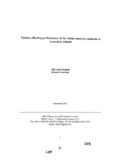Factors affecting performance of the ethnic minority students in secondary schools

Date
2003-12Publisher
BRAC Research and Evaluation Division (RED)Author
Kalam, Md. AbulMetadata
Show full item recordCitation
Kalam, M. A. (2003, December). Factors affecting performance of the ethnic minority students in secondary schools. Research Reports (2003): Social Studies, Vol – XXXIII, 205–228.Abstract
BRAC started working with secondary education through its post primary basic education
program since 2001. After piloting in 20 schools BRAC is now operating this program in 250
schools of which 175 have different proportions of ethnic minority students. This particular study
attempted to explore the level of and factors affecting the performance of the ethnic minority
students in secondary schools. Five schools having at least 25% ethnic minority students, one
from five areas of Kalmakanda, Kulaura, Haluaghat, Panchbibi and Dhamoirhat were selected
purposively for the study. Three methods/techniques of classroom observation, scanning of
documents and group discussion with teachers, ethnic minority students and their parents, were
followed for data collection using checklists. The study found that ethnic minority students were
lagged behind their Bangalee classmates in their performances in terms of completion, noncompletion,
dropout and repetition in different classes, attendance at school, and results in public
and school examinations. Several factors were found which might affect ethnic minority
students' performance in secondary schools. Prominent among these factors were attitude of
teachers towards ethnic minority students' potentiality; poor economic condition; relationship
with Bagalee classmates; treatment by teachers in the classroom; private tutor dependent
education; lack of helping hand in study at home; lack of awareness among parents; attendance
at school; lack of security; lack of educational environment at home, etc. The study also found
that schools' responses to these factors was very few with limited or no results. Furthermore, the
study gained some suggestions from different groups of respondents for improving the situation.
